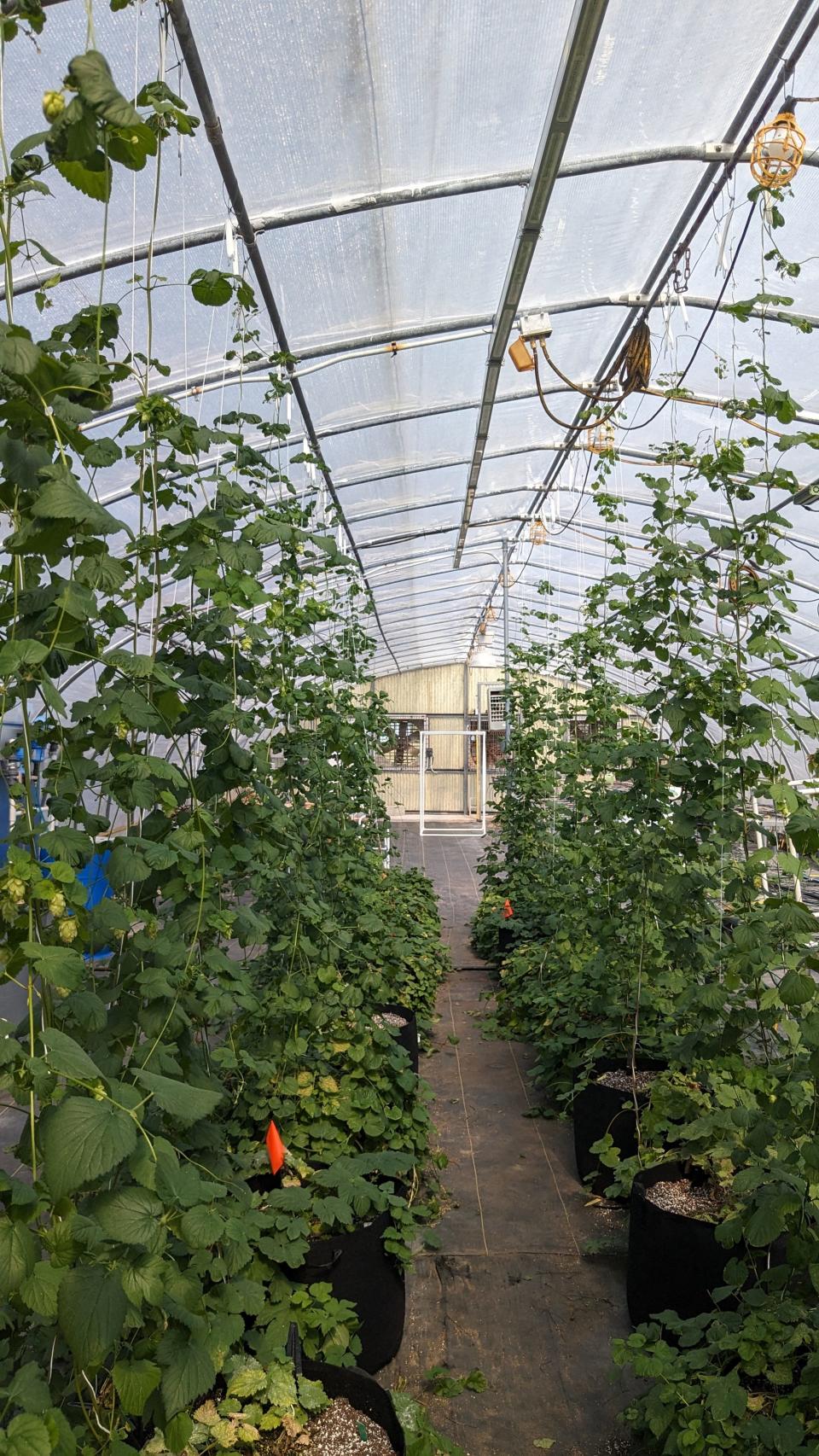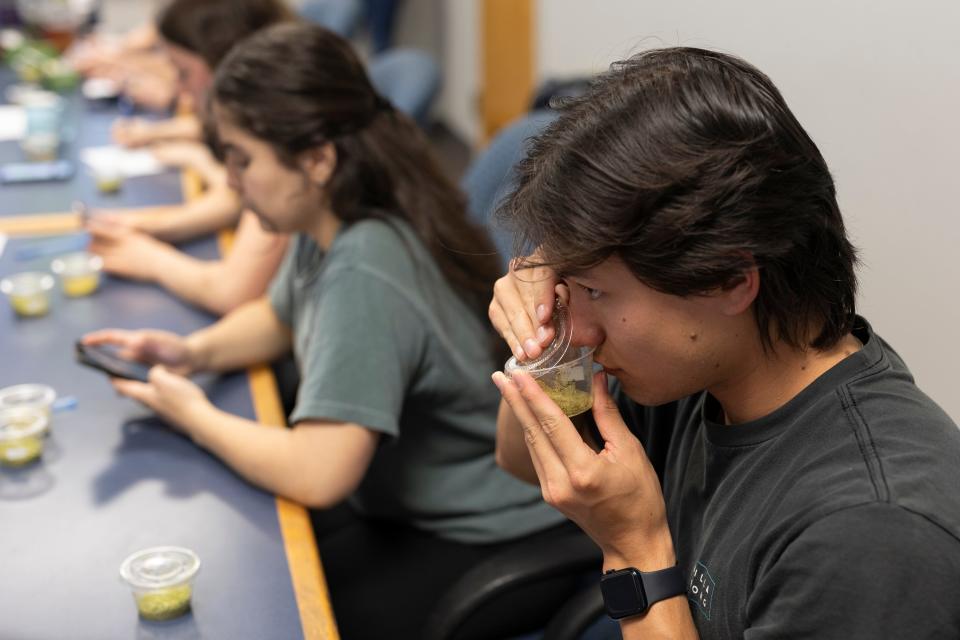UF's solution to growing hops in Florida's climate is more simple than you may think
The University of Florida is making strides in crafting alcohol; more specifically, a method for growing hops despite Florida's incompatible climate.
Through the use of greenhouses, researchers at UF's Institute of Food and Agricultural Sciences (UF/IFAS) may have identified a method to make hop-growing viable in Florida, which is typically not readily available due to the state's climate.
Katherine Thompson-Witrick, UF/IFAS food science and human nutrition department assistant professor and leader of the study, said in a news release that this has never been done in Florida.
The experiment
Thompson-Witrick and her team were awarded a grant by the Florida Department of Agriculture and Consumer Services in January 2023, a news release said, and have since harvested two crops of hops from a greenhouse in Apopka, located at the UF/IFAS Mid-Florida Research and Education Center. Typically, hops aren't harvested until around three to five years to allow the plants to mature.

"The fact that we are pulling the plants now is kind of unheard of," said Thompson-Witrick in an interview with The Sun. "We had to switch out one of our plants because it just did not produce hardly anything. But our Cascade, we ended up getting about 74 grams per plant, which is, again, really on the low side, but that's for the first harvest."
The team planted 20 seedlings of traditional, common hops plants (Cascade and Chinook varieties) in April 2023 that were each 2 inches tall, a news release said. By July 2023, the plants had reached 20 feet tall and, according to the news release, the vines had to be manually separated to prevent them from becoming tangled.
“We saw a substantial amount of growth in the first nine months of this project, which is really outstanding and amazing for us,” said Thompson-Witrick in a news release.
Locally: Your guide to Greater Gainesville craft breweries
The objective is to develop practices that maximize aromatic and flavor characteristics, which can be compared to those associated with traditional craft beer-brewing regions such as Yakima Valley, Washington. Based on this preliminary research, the growth and flowering rates of the plants grown in Apopka suggest the method could obtain the same yield of hops per plant as Yakima Valley.
Supplemental lighting installed within the greenhouse was the key to the plants' growth, a news release said.
Hops grow best when given a minimum of 16 hours of sunlight, which is available at latitudes of 35 degrees and above. Florida’s uppermost latitude reaches just 31 degrees, UF/IFAS said. The UF/IFAS Gulf Coast Research and Education Center in Balm has conducted breeding studies to develop hops capable of adapting to the state’s shorter days.
Thompson-Witrick said in an interview with The Sun that her colleague, Brian Pearson, Department of Environmental Horticulture associate professor, had previously worked on growing hops in Florida, but the heat was often too intense (especially in the summer) and caused the plants heat stress. This, combined with the need for additional lighting, led them to the idea of growing hops in a greenhouse.
"Florida, while we're very much an agricultural-based state, unfortunately, we're unable to grow all of our number of ingredients required to make beer," Thompson-Witrick said in an interview. "The idea is that we would be able to produce enough hops that we could make specialty products or specialty beers with it."
The greenhouse, however, cannot control temperatures well once they reach around 98 or higher, and Thompson-Witrick said signs of heat stress could be seen on plants during extremely hot months.
The team hopes to harvest for a third time in late June or early July. The team plans to make a small, experimental beer with the third harvest.
Testing the senses
Using a gas chromatography mass spectrometer, Thompson-Witrick is able to detect the chemical compounds contained within the hops; the alpha and beta assets that quantify how bitter a beer brewed from them would be.
"We do that so we can kind of compare them to other hops," said Thompson-Witrick in an interview. "It's our way of determining what aromatics, or what compounds, are primarily being picked up by an individual... I can tell you every single individual compound within that beer, but I can't tell you how they're going to interact with each other because I'm analyzing those compounds individually. This way, we're looking at the compounds holistically... how they interact all together."
During the recent spring semester at UF, 14 students met regularly to smell condiment containers with contents resembling shredded alfalfa with a strong earthy odor, but layered beneath with hints of citrus, spice and floral notes. The students recorded the strength of the various scents they detected, smelling both the Apopka hops as well as commercial ones, but without knowing which hops were which.

A news release said these sensory trainings will lead to official blind testing and comparison between commercial varieties of hops and the product grown with UF/IFAS.
“We want to disseminate our findings to growers to help with diversifying the state’s agricultural crops and to provide information that would be critical to further cultivating hops,” she said in a news release.
Florida is known for its craft beers and breweries; in 2023, the Brewers Association reported 404 craft breweries were counted in the state with over 1.3 million barrels of craft beer produced per year. Based on 2023 statistics, in 2022 the craft brewing industry generated slightly over $4 billion in Florida, the fourth-largest amount in the country, according to the Brewers Association.
This article originally appeared on The Gainesville Sun: UF grows hops plants in greenhouses

